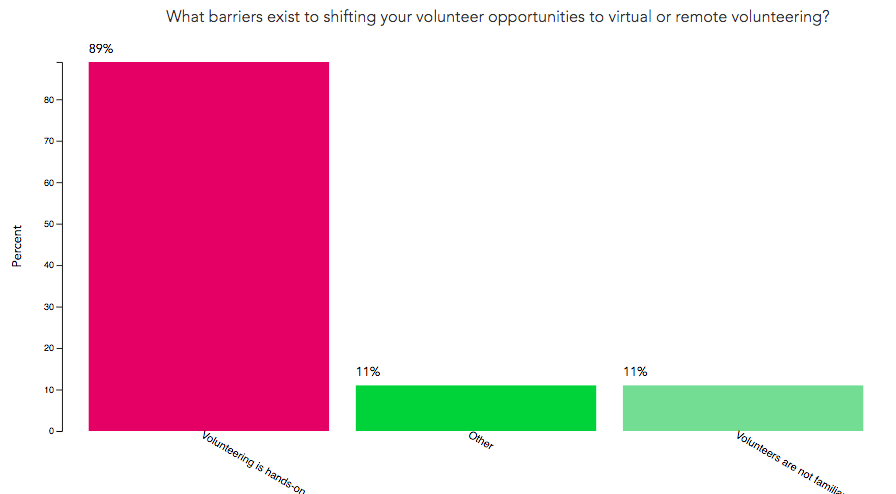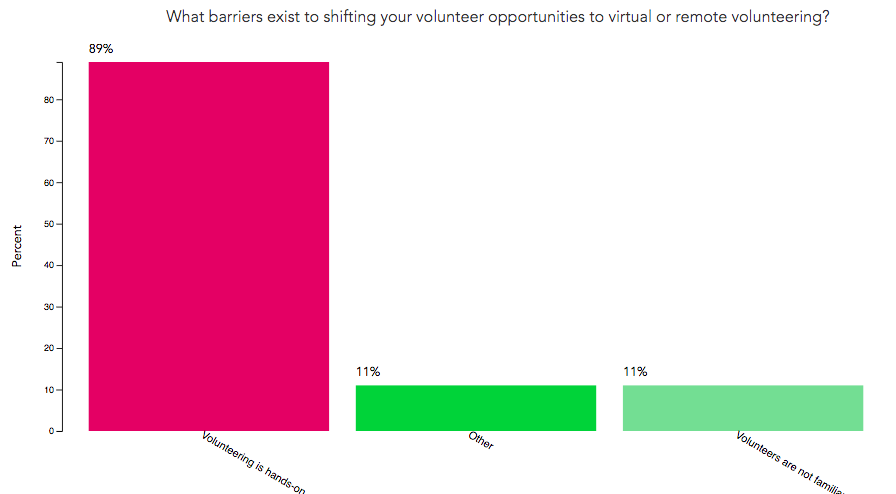As experts continue to caution against large group gatherings, it becomes increasingly apparent that common spaces in the office, campus, and community will be drastically altered. In the upcoming months, we will be working to support safe and impactful engagement for our entire community; while this post focuses on our higher ed partners, we believe that the business, city, and nonprofit community will also be able to benefit from the ideas and measures we highlight.
While governments and health experts continue to develop protocols to prevent the spread of COVID-19, institutions may opt to reconsider their courses, expectations, and evaluation schematics. Recently, our partners at CSU, the nation’s largest four-year college system, announced their plans to move the majority of their Fall 2020 classes online. Other institutions are considering a variety of paths, from social-distanced seminars and virtual lectures, to going virtual after thanksgiving and adding a summer semester in 2021, to limiting which students are able to return to campus. In all of these cases, there are clear needs for on-campus public health awareness campaigns, testing, contract tracing, and isolation of cases.
Community engagement centers and service-learning courses may find themselves facing additional challenges as they strive to navigate a new form of engagement, potentially without the localized, in-person efforts that have characterized engagement previously. For those who decide that reopening is not a possibility, how does a way of learning so deeply rooted in a local community foster the same education and impact remotely? How, on the other hand, can service-learning courses that opt to continue in person engagement do so safely?

We are at a crossroads. We could throw up our hands and give up on the community for its high risks. We could also travel the other road, where our engagement becomes imperative to the community we serve. Higher education is needed now more than ever to be a beacon of light, not only for the research generated from the labs on campus, but also for the helping hands and heart that our students, faculty, staff and alumni provide to the most vulnerable at this time.
There will be no return to “normal” or to the way things were. We are better and more innovative than that. We need to roll up our sleeves and dig in to new ways of being. The issues of poverty, health disparities, food insecurity and other inequities that were there before the pandemic have been amplified as a result of the outbreak, and will likely linger for some time to come unless we do something now.
While the circumstances are certainly challenging, there is much to be hopeful about in these trying times. This is an opportunity to consider how community engagement can become more accessible to students, including those who may not have the time or the ability to commit to traditional in-person forms of volunteering. It is an opportunity to increase the ways that your institution works with partners, strengthening partnerships and learning new forms of support and mutual growth. It is an opportunity to double down on the commitment serving your community, and to the populations who have already been most affected by COVID-19.
These new times call for new methods of engagement. The GivePulse team is working closely with campuses, community organizations, state and local health departments, businesses, chambers of commerce, volunteer centers and many other collaborative partners across the globe to retool, rethink and re-emerge with a fresh focus and energy to tackle the challenges ahead.
In the course of communicating with our amazing campus partners, we have already heard so much to be hopeful about, as service-learning and community engagement centers have mobilized to respond not only to the needs of their vulnerable community members, but also to the public health crisis we currently face.
Over the next few weeks, we will be working closely with our public health, virtual/remote engagement, and curriculum development task forces to create further resources that we hope will help institutions work through these challenging times. We will create best-practices guides, addressing, among other things:
- How to communicate, implement, and evaluate virtual service-learning and engagement
- Safety measures to consider before allowing students to engage in-person with community partners
- Important updates to liability waivers as risks associated with engagement change
- Ways that student volunteers and engagement centers can support aspects of campus planning, logistics, execution, and assessment, including recruiting and training student volunteers as contact tracers
- Other opportunities for COVID-19 specific work, such as properly equipped and approved campus labs running COVID-19 tests, that provide an extraordinary learning opportunity for students and faculty mentors
We look forward to highlighting the unique efforts of our partners to help other institutions and communities learn from their successes and failures.
As always, let us know how we can collaborate with you, and schedule a call with our team to brainstorm or learn more.

